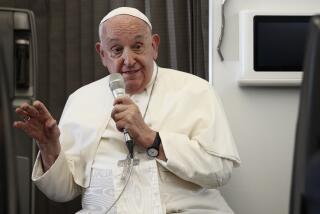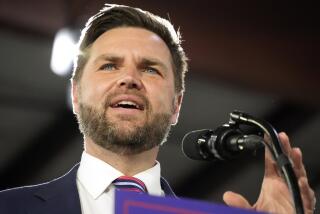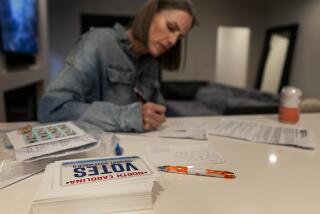St. Louis Catholics Debate Political Directive
ST. LOUIS — After Wednesday’s morning Masses, Catholic parishioners voiced anger and support for the archbishop of St. Louis, who issued a pastoral letter saying it was a “grave sin” to vote for politicians who supported same-sex marriage, abortion or stem-cell research.
Archbishop Raymond Burke’s letter states that voters are violating “the solemn duty to protect human life” if they support politicians who back those issues. The letter -- about 6,700 words long -- was published Friday in the weekly archdiocesan newspaper and posted on its website.
“Procured abortion and homosexual acts are intrinsically evil, and, as such, can never be justified in any circumstance,” Burke wrote. “Although war and capital punishment can rarely be justified, they are not intrinsically evil; neither practice includes the direct intention of killing innocent human beings.”
If all candidates in a race support abortion rights or same-sex marriage, then a Catholic can vote without committing sin, according to Burke’s letter.
“I don’t know what to do,” retiree Terrence Praince, 69, said as he left Mass Wednesday at the Cathedral Basilica of St. Louis. “I think [same-sex] marriage is wrong, but I’m also against the war. My wife and I are both Democrats. How do we vote?”
A summary of the letter, as well as a question-and-answer section regarding it, was released this week.
A few priests took things a step further and invited members at several area Catholic churches to sign a pledge saying that legalized abortion, euthanasia, embryonic stem-cell research, human cloning and same-sex marriage were “intrinsically evil.”
The archbishop published his letter as the city prepared for Friday’s debate between President Bush and his Democratic challenger, Sen. John F. Kerry of Massachusetts, at Washington University in St. Louis.
Burke earlier this year said he would not give Communion to Kerry, who’s Catholic, because of the politician’s support of abortion rights.
The pastoral letter was not designed to sway voters away from Kerry or any other specific candidate, said the Rev. Edward J. Richard, spokesman for the Archdiocese of St. Louis. Instead, the archbishop was “presenting traditional Christian teaching to help voters make informed decisions, not only about this election but future ones,” Richard said. “We had these values before there were Republicans and Democrats. And the church will have them long after this race.”
Burke’s letter provoked debate among readers on the editorial pages of local newspapers.
“You cannot pick and choose what you believe in. If you are a Catholic, you should be willing to follow the church’s teaching. Archbishop Burke is merely echoing what the Bible teaches us on these subjects,” one person wrote to the St. Louis Post-Dispatch.
Countered another: “After reading Archbishop Burke’s letter, I must think otherwise when it states he is not endorsing a particular candidate.... Shaped by 35 years of Catholic experiences, I will not let Burke guilt me into a confessional.”
Theologians and presidential campaign analysts have argued about the letter’s political ramifications on TV news broadcasts. They’ve debated whether it would draw votes away from Kerry or whether people would rebel and intentionally vote for him.
This isn’t the first time the archbishop has weighed in on politics. While a bishop in La Crosse, Wis., Burke issued a directive in January stating that any Catholic politician who backed euthanasia or abortion rights should not be given Communion.
Burke brought the issue up again after he arrived in St. Louis in late January and made his comment about denying Communion to Kerry. The archbishop of Atlanta, and the bishops of Charleston, S.C., and Charlotte, N.C., later issued similar statements.
Of the 2.2 million people who live within the Archdiocese of St. Louis -- which consists of the city and 10 surrounding counties -- about 550,000 are Catholic.
Some followers wonder whether they will have to go to confession if they vote for Kerry. That question was asked by a few who attended Mass on Wednesday. Walking along Maryland Avenue on her way to the Cathedral of St. Louis, Carrie Blayner spotted signs promoting the Kerry-Edwards campaign.
She pulled open the church’s heavy wooden doors, walked inside and sat in a pew toward the back. Above her, tiny tiles formed massive murals dedicated to various saints. Somber gray statues and gilded angels gazed upon the sparse crowd.
“I’ve read the letter, and I want to do what’s right,” said Blayner, 42, a housewife who attended Catholic school. “We trust the church to guide us. But voting as a sin? It seems a little extreme.”
There is a centuries-long tradition of clergy guiding parishioners about political and legal issues, and Burke’s past comments and last week’s letter reflect a desire to remind Catholic voters of the issues the church considers important, said Luis E. Lugo, director of the Pew Forum on Religion & Public Life.
“Politicians see votes. For the church, this is about ethical questions,” said John C. Green, a political science professor at the University of Akron in Ohio.
A spokesman for Bush declined to comment on the letter.
Kerry spokesman David Wade issued a statement: “We have the deepest respect for the leaders of the Catholic Church. Every Catholic struggles with their own conscience, and Catholicism is not defined by one stand on one issue.”
While Missouri as a state tends to vote more conservatively, its urban centers see themselves as more liberal. In the 2000 presidential election, Bush beat Al Gore by 3 percentage points statewide. In St. Louis, Gore swept Bush by more than 50 percentage points.
*
Times staff writer Matea Gold contributed to this report.
More to Read
Sign up for Essential California
The most important California stories and recommendations in your inbox every morning.
You may occasionally receive promotional content from the Los Angeles Times.










